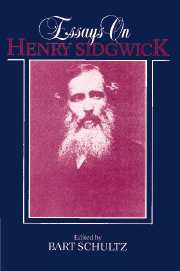Book contents
- Frontmatter
- Contents
- Foreword
- Acknowledgments
- List of contributors
- List of abbreviations
- Introduction: Henry Sidgwick today
- PART I Common-sense morality, deontology, utilitarianism
- PART II Egoism, dualism, identity
- 5 Sidgwick's pessimism
- 6 Sidgwick and the history of ethical dualism
- 7 Sidgwick and the rationale for rational egoism
- 8 Sidgwick on ethical judgment
- PART III Hedonism, good, perfection
- PART IV History, politics, pragmatism
- Index
5 - Sidgwick's pessimism
Published online by Cambridge University Press: 05 June 2012
- Frontmatter
- Contents
- Foreword
- Acknowledgments
- List of contributors
- List of abbreviations
- Introduction: Henry Sidgwick today
- PART I Common-sense morality, deontology, utilitarianism
- PART II Egoism, dualism, identity
- 5 Sidgwick's pessimism
- 6 Sidgwick and the history of ethical dualism
- 7 Sidgwick and the rationale for rational egoism
- 8 Sidgwick on ethical judgment
- PART III Hedonism, good, perfection
- PART IV History, politics, pragmatism
- Index
Summary
But the fundamental opposition between the principle of Rational Egoism and that on which such a system of duty is constructed, only comes out more sharp and clear after the reconciliation between the other methods. The old immoral paradox, “that my performance of Social Duty is good not for me but for others,” cannot be completely refuted by empirical arguments: nay, the more we study these arguments the more we are forced to admit, that if we have these alone to rely on, there must be some cases in which the paradox is true. And yet we cannot but admit with Butler, that it is ultimately reasonable to seek one's own happiness. Hence the whole system of our beliefs as to the intrinsic reasonableness of conduct must fall, without a hypothesis unveriflable by experience reconciling the Individual with the Universal Reason, without a belief, in some form or other, that the moral order which we see imperfectly realized in this actual world is yet actually perfect. If we reject this belief, we may perhaps still find in the non-moral universe an adequate object for the Speculative Reason, capable of being in some sense ultimately understood. But the Cosmos of Duty is thus really reduced to a Chaos: and the prolonged effort of the human intellect to frame a perfect ideal of rational conduct is seen to have been foredoomed to inevitable failure.
- Type
- Chapter
- Information
- Essays on Henry Sidgwick , pp. 163 - 174Publisher: Cambridge University PressPrint publication year: 1992

